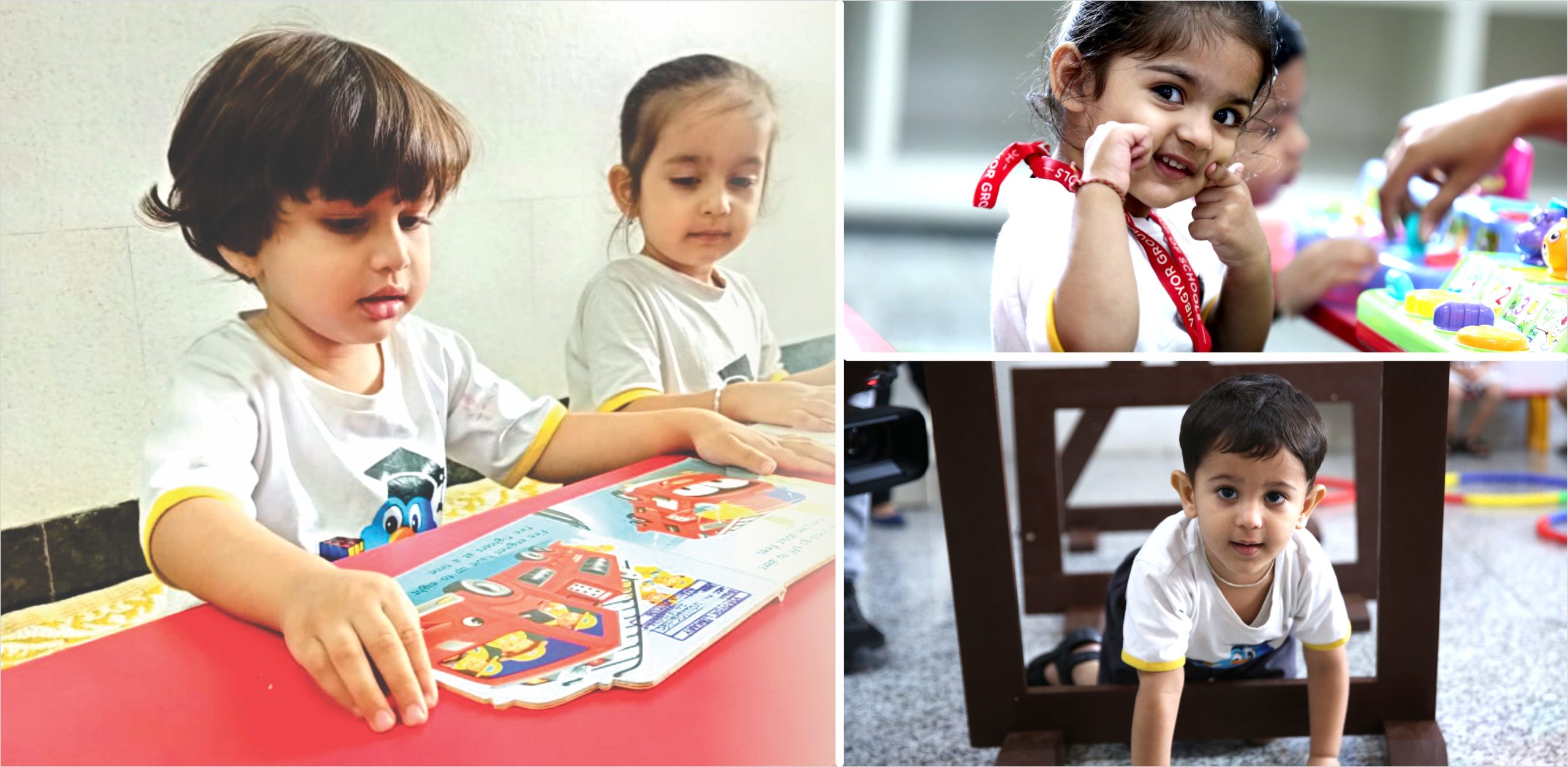![]()
Preschools have gained significant prominence, becoming an essential foundation for early childhood education. They are no longer just places for kids to play or socialise, but rather vibrant spaces where young minds are prepared for the future.
In the past, the Vedic education system required students to reside in the residential schools known as gurukuls. They studied the Vedas, languages, philosophies, and other skills under the guidance of their gurus.
Then, the early childhood education paradigm shifted to Montessori education. Mahatma Gandhi met Maria Montessori at a roundtable conference in London. He recognised the need for Montessori education for children in India and invited her to start a school there. Thus, the Montessori movement commenced in 1939, with a small group of students learning on the banks of the Adyar River in Chennai.
Then and Now: The Changing Face of Preschool Education
Over the years, preschool infrastructure in India has drastically transformed. From $4.2 billion in 2023, the ‘Indian Pre-School/Childcare Market Report’ states that the Indian preschool market is projected to reach $10.2 billion by 2032.
A realisation amongst parents about early childhood education has contributed to the growth of preschools in India. An increase in the number of nuclear families has also urged working parents to look for reliable early education options for their children. Additionally, rapid urbanisation and a rise in disposable income have enabled families to invest more in their children’s early education.
However, one of the biggest contributors to this changing landscape of preschools in India is government policies. They have provided the necessary framework for the establishment and growth of preschool education in India.
The National Education Policy 2023: A Blueprint for the Future
The new National Education Policy (NEP) of 2023 transitions from the 10+2 structure to a 5+3+3+4 system. The 5+3+3+4 structure denotes that students from the age group of 3-8 will spend five years in the foundational stage, whereas ones from 8-11 will spend three years in the preparatory stage. Students from the age group of 11-14 and 14-18 will spend 3 years and 4 years in the middle and secondary stages, respectively.
As mentioned by the International Journal for Multidisciplinary Research 2023, the motto of NEP is to Educate, Encourage, and Enlighten, with the government aiming to develop 21st-century skills in the students of India.
Key highlights of the NEP 2023 are:
- Foundational Literacy and Numeracy (FLN): Improve every child’s basic writing, reading, and numerical skills by Grade 3.
- Holistic development: Focus on cognitive, social, physical, and emotional abilities along with promoting critical thinking, problem-solving, creativity, and more.
- Competency-based learning: Move away from rote learning and memorisation to learning that includes collaboration, creative learning, and digital literacy.
- Redesigned pedagogy: Integrate vocational courses, arts, and sports for a well-rounded curriculum.
- Technological advancements: Introduce the National Educational Technology Forum (NETF) that promotes technological innovation in education to improve classroom processes and teacher development.
The Influence and Impact of Preschool Trends and Philosophies
While government policies have been an integral factor in the growth of early childhood education in India, various philosophies have laid the groundwork for modern preschools in India, defining the new-age and developmentally appropriate curriculum and pedagogies.
Promising an innovative and globally competitive educational system, the inclusion of international educational philosophies within the Indian educational ethos equips young minds to thrive in a world where knowledge knows no borders.
Kindergarten Shaping Lifelong Learners
In the 19th century, Friedrich Frobel acknowledged the value of play-based learning and established the kindergarten concept. Kindergarten became a fundamental part of preschool teaching methods in India and fostered an environment where children learned through guided activities. Children learn the fundamentals of reading, writing, counting, shapes, creative arts, and social skills.
Montessori Magic: Self-Directed Path
Under this philosophy, children get the chance to leverage an opportunity to learn and self-correct at their own pace. Introduced by Maria Montessori, this learning method is impactful for kids who prefer doing things at their own pace and speed.
With the changing landscape of preschools in India, teachers can integrate the Montessori approach by opting for activities that children prefer rather than formal teaching methods. Activities like solving puzzles, scavenger hunts, or gardening make children self-motivated learners.
Waldorf Wonders: Hands-on Learning
Developed by Rudolf Steiner, this philosophy explores a comprehensive and holistic side of education, aiming to cultivate students’ intellectual, artistic, and practical abilities, emphasising the importance of imagination and creativity.
One of the integral preschool teaching methods in India, it incorporates activities like storytelling, singing, painting, or taking a walk in nature, which help children become more creative and discover new things about themselves.
Reggio Emilia: The Third Teacher Principle
Depending on experiential learning, this philosophy taps into a child’s curiosity and desire to learn via experimentation. Introduced by Loris Malaguzzi, this hands-on experience incorporates the environment as the third teacher.
While children can enhance their creativity with storytelling, word building, and other games, teachers can document these activities through videos, notes, and photographs.
Forest School: Learning Outdoors
Originating in Denmark, this philosophy builds a strong connection between children and nature. Similar to Rabindranath Tagore’s Naturalism philosophy, kids get to play, build, and explore materials in an outdoor setting.
Apart from inculcating a love for nature, this philosophy teaches children to be empathetic and resilient and makes them self-aware and better at problem-solving. A study by the Australian Council for Educational Research states that 90% of a child’s brain develops in the first five years of their life. This emphasises the crucial role that preschools play in the holistic development of a child. While new trends emerge and various preschool educational reforms materialise, parents must recognise the importance of early childhood education on a child’s overall development, and how it can enhance their future learning outcomes and contribute to the overall development of the nation.
Do check out VIBGYOR Kids and VIBGYOR Roots– VIBGYOR Group of Schools’ preschools.
